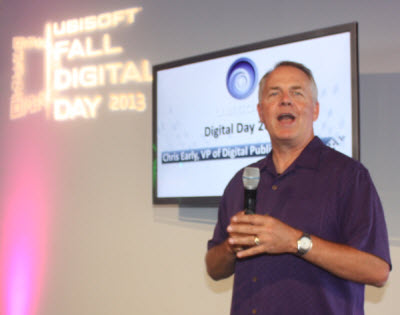GamesBeat: You have mentioned that your triple-A console game designers are sometimes jumping across genres to do something totally different. Are there a lot of those examples?
Early: Yeah. The team that did Valiant Hearts is a combination of people who had been working on a bunch of hardcore games, like some Rayman level designers. They’re doing a game that’s focused on five people’s struggle through World War I. It’s a grim topic, but they’ve made it fun. It’s historically accurate. There are elements of many of these people’s personal histories in there. Some guy’s grandfather’s actual dog tags are in there. It’s a small team making the game, maybe 20 people. So there’s a bunch of those examples inside Ubisoft.
That’s not to say we aren’t still making Assassin’s and these other top-line titles. But the freedom is there, so that when people come and pitch and want to make something, they’re able to do it. Endwar Online came the same way. The Shanghai studio said, “Look, we think we can do something with this. We have the IP.” They didn’t have an engine for it, but they had a strong belief that they could do something, and away it went.
GamesBeat: It certainly seems like you have the volume and variety of activity going on in digital. The degree of experimentation that Ubisoft does seems to exceed that of other folks. Maybe they keep what it’s doing hidden, but Activision is down to three franchises now.
Early: The plus and the minus is that they don’t look like they’re failing anywhere, either. Maybe they do a bunch of things – I know we do. But I think that comes back to the learning process. It helps our studios grow.
GamesBeat: What’s your opinion of cloud gaming?
Early: A lot of what’s gone on has been thinking about cloud as a distribution mechanism. In many cases, part of the failure for that is, there haven’t been that many players. I have a good gaming PC. Do I really need a dumbed-down PC to play through the cloud? The bigger opportunity, where we have some design teams working, is where you think about having an unlimited amount of processing power in the cloud, to deliver a better experience.
What if, instead of having just a few cores in an Xbox or a PlayStation 4, you had 40 cores in the cloud working on creating gameplay for you?
GamesBeat: Like the cloud processing idea Microsoft has floated with the Xbox One.
Early: Yeah, where you talk about parallel computing from a gaming perspective. What if you had the equivalent of two or three PCs running your AI? How much more intuitive or more random of an AI could there be?
I’ve played games where it’s like, “Okay, I know what that guy’s gonna do now. He’s coming around that corner. I’ll get right around here. That’ll work every single time.” What about when there’s enough processing power to let that AI figure out, “Okay, don’t get caught around that corner”? Or when you start to have personality-based AI, where it takes a lot of processing power to render a decision. What the AI actually does looks similar to what’s going on today, but it’s the decision-making process that has to go on – plus weather and environment and interaction between players. It opens the door for the massively-multiplayer-affected world. Now you can afford to keep that type of data ongoing. That’s where I see huge opportunities for making games better than they are today.
GamesBeat: That’s interesting, because I wasn’t sure yet whether anyone was taking Microsoft up on that suggestion. It looks like it’s one of those still-to-be-realized advantages of the cloud.
Early: It takes a different design perspective. It takes a game that won’t run offline. There’s a risk with that as well. You’ll have to play in an environment that is only available online. Nobody has a problem with that when it’s World of Warcraft. The rest of the packaged goods industry has to battle that on a regular basis. So we’ll see. Maybe it’ll only be online games and multiplayer games that start doing that. But we’re looking at what we can do there and how we can use that power to deliver that.
When you think about it from a game design perspective, it lets worlds continue to exist and evolve. We do that in a broken way today. You play a game on your Xbox. You come back tomorrow. The system looks and says, “So many hours have passed, I’ll advance the game like so.” But it’s brute force. You get 10 hours of deposits into your bank account or whatever it’s supposed to do. There’s no real “happening” happening while you’re not there.
What this opens up, not only can the world evolve, but in a multiplayer adversarial environment, where you have enough control to code your defenses, it could play a decent defense for you. You’ll feel like you aren’t going to get victimized just because you’re offline.
VentureBeat's mission is to be a digital town square for technical decision-makers to gain knowledge about transformative enterprise technology and transact. Learn More



